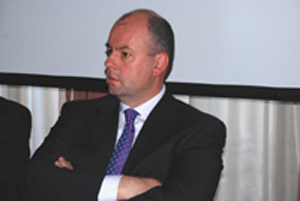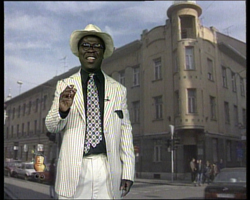<!– /* Font Definitions */ @font-face {font-family:WhitmanSLO-RomanLF; panose-1:0 0 0 0 0 0 0 0 0 0; mso-font-charset:0; mso-generic-font-family:auto; mso-font-format:other; mso-font-pitch:auto; mso-font-signature:3 0 0 0 1 0;} /* Style Definitions */ p.MsoNormal, li.MsoNormal, div.MsoNormal {mso-style-parent:””; margin:0cm; margin-bottom:.0001pt; mso-pagination:widow-orphan; font-size:12.0pt; font-family:”Times New Roman”; mso-fareast-font-family:”Times New Roman”;} @page Section1 {size:612.0pt 792.0pt; margin:70.85pt 2.0cm 2.0cm 2.0cm; mso-header-margin:36.0pt; mso-footer-margin:36.0pt; mso-paper-source:0;} div.Section1 {page:Section1;} –>
The Deputy Mayour of Koper – Capodistria throws down the challenge: a single Port Authority to take on northern Europe

Q Deputy Mayor, you’ve always lived close to the border with Italy. What has this demarcation line meant to you and your family?
A A border is always a border even though the one with Italy was always permeable. My father worked right up to his retirement in the shipyards at Muggia. Almost half of my relatives, after the post-war exodus of ethnic Italians from Yugoslavia moved to Triest or its surroundings. The same went for our friends. Maintaining contacts was difficult. Locals could cross at the smaller border posts using the lasciapassare (a locally-valid passport). These however closed at a certain time so you were forced to make long detours to the international crossings to return home. One shouldn’t forget either that at that time the border was heavily patrolled by the Yugoslav military and this made the climate tense. The entry of Slovenia into the Schengen area was a great moment for us and we felt a lot freer.
Q Could you lay out your point of view on how the Euroregion should function?
A Completing the regionalization of Slovenia should make the birth of a Euroregion easier. I believe that the Euroregion could represent a step forward on the road towards cooperation between adjoining regions but everything depends on what one seeks to include in the field of cooperation.
Q What geographical area should the Euroregion cover in the view of Koper – Capodistria?
A I don’t have any firm ideas on the borders of the Euroregion. In my opinion it should include areas that share a common history, traditions and problems, but, to my eyes, the area covered is less important than the common initiatives that those involved can undertake.
Q The possible reservations against the birth of a Euroregion are often linked to a presumed risk of loss of sovereignty in one’s own area. What is your view on this?
A I don’t believe loss of sovereignty is a real risk. National borders will not be eliminated and the peoples’ identity would be strengthened by the various joint initiatives. Doubts of this type are baseless.
Q We know that you are in constant contact with the neighbouring regions of Croatia and Italy. What cooperative ventures are already up and running with the various municipalities in Istria and Friuli Venezia Giulia?
A Koper – Capodistria believes that good neighbourly relations should be a priority when seeking to promote projects in common at a European level. Much has already been achieved in the field of environmental protection and planning at a multilateral level through the various initiatives that we are taking part in. There are plenty of opportunities for bilateral meetings with the local councils of Triest, Muggia, San Dorligo della Valle – Dolina and elsewhere in Italy. On the Croatian side of the border we are in regular contact with the Istrian local councils.
Q Do you see the possibility of resolving shared problems in the local area by using the Euroregion and what are you currently doing in this field?
A We are trying to agree on the sorting of waste and its subsequent recycling with Triest. Everything that cannot be recycled would then go to be incinerated at Italian plants, as, on our side of the border we lack the necessary infrastructure. The other issue currently under examination is that of water supplies. The water resources for Koper – Capodistria are running out and bringing in new ones would be extremely costly. We would also like to draw attention once again to our interest in linking the school networks. Finally, I cannot miss out the area of healthcare provision where a cross-border plan is being drawn up for both emergency services and treatment in the region’s hospitals.
Q What are the prospects of economic cooperation through a new political entity such as the Euroregion?
A For Koper – Capodistria the integration of the ports of the upper Adriatic is of the utmost urgency to take on the competition offered by the large operators in Northern Europe. Defining strategies together could further allow the advantages that our maritime ports offer to come to the fore. I don’t rule out that, with time, we might see a single port authority. Greater coordination is also possible in tourism, with a joint offer in the market towards third countries. This should be put forward whilst avoiding unnecessary competition and duplication in the itineraries and peculiarities of the various areas. Above all environmental protection and sustainable development should be the dominant theme. For example, there is no place for regassification plants in our area as tourism would be the main sector to suffer. x
The sad reality of the division caused by the demarcation line between Italy and the then Yugoslavia had to be faced up to by the inhabitants of the hills above Muggia, between Triest and Koper – Capodistria. Villages such as Hrvatini – Crevatini, Kolomban – Colombano and Cerej – Cerei along with others, that even today hold a good proportion of Italian nationals, found themselves on the Yugoslav side of the border. One of the protagonists of the political and social life of Hrvatini is professor Alberto Scheriani. 43 years old with a degree in History from the University of Triest, he is the Headmaster of the Italian Middle School of the (Slovene) town of Izola – Isola. Deputy mayor of Koper – Capodistria (the municipality that includes Hrvatini), for many years he has been an important personality within the Italian community in Slovenia. x
